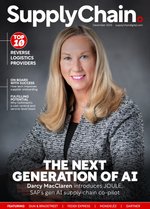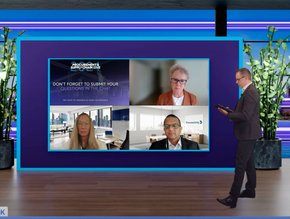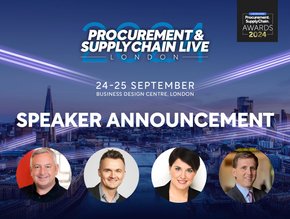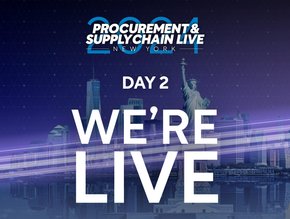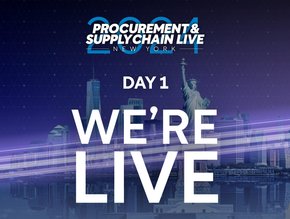Why technology is the future for supplier onboarding

Having a strategic approach to supplier onboarding is a key component of supply chain risk management.
Brian Alster is GM North America, Finance & Risk, for business intelligence and analytics multinational Dun & Bradstreet. He says that in today’s uncertain world, it is imperative that C-suiters “act with urgency around risk”.
Dun & Bradstreet helps businesses turn data into actionable insight, by leveraging its data cloud, which contains information on 500 million businesses around the globe.
In his role, Alster helps procurement and global sourcing organisations solve supply chain disruption challenges, and also to reduce expenses.
He says that the major risks facing supply chains right now is inflation, an unpredictable global economy and the ever-increasing regulatory burden on firms.
The regulatory landscape is in a state of extreme flux, due to increasing geopolitical issues (Russia & Ukraine, China and the US and now Israel and the wider Middle East), and Alster says companies are struggling to keep up.
“This year we expect to see increased ESG regulation, which most companies have not yet built into their supplier onboarding risk assessment processes,” he says. “Companies are trying to go from being reactive to being proactive, which is really challenging in a global sourcing environment where they are trying to do more with the same, or fewer, resources.”
In terms of managing supply chain risk, Alster says there are four components of a successful supply chain program.
“The first is having a risk-based assessment process that helps companies identify potential supplier risk upfront during the onboarding process,” he says. “ That process should include a review of financial and credit, health, cyber risk, ESG risk, sanctions, and beneficial ownership.”
The second, he says, is to look at tier one suppliers in order to understand where the critical suppliers are. “These might be in the sub-tier supply chain – in tiers two or three, which are your supplier’s suppliers,” he explains. “Most of our customers struggle for visibility on that second and third tier.”
He adds: “Thirdly, we encourage clients to identify those suppliers that are most critical. Firms then need to put a continuous monitoring program in place, to ensure the risk profile of those suppliers has not changed. If it has changed, it'll help inform decisions around the amount of business you're doing with that company.”
Alster and his team also help companies shift from being reactive to being proactive. “Being able to identify alternative suppliers among your most critical group of suppliers is really important,” he says. “If you have alternatives on hand you're able to pivot quicker. You can never eliminate supply chain disruption, but you can proactively mitigate the impact it has on profitability and the ability to maintain operations.”
Alster says the take-away message for C-suiters is to “act with urgency on strategic supplier onboarding”.
He adds: “Invest in your processes, to ensure you can do more with the same, or fewer, resources. This usually means automating your supply chain data, so you're finding new suppliers or managing existing suppliers.”
Technology has a vital role to play in supplier onboarding. One solution that exemplifies what is happening in this space is SmartOps, from UST, an AI-powered cognitive automation platform that holistically learns and reimagines business processes, while intelligently digitising and compressing manual workflows.
Running on AWS, SmartOps works across business and IT operations, including help desks and onboarding tools. It optimises procurement and supply chain management – everything from tracking shipments and invoice payment to contract management to ESG compliance.
Technology of another flavour is also helping streamline and improve supplier onboarding processes and tighten protocols: blockchain.
One company at the forefront of helping drive blockchain adoption in supply chain is IT consultancy Tech Mahindra – part of the Mahindra Group, founded in 1945 and one of the world’s largest multinational federation of companies, with 260,000 employees in 100 countries.
Tech Mahindra meets the needs of global customers by leveraging next-generation technologies – including 5G, blockchain, cybersecurity and AI – to enable end-to-end digital transformation for global customers.
Rajesh Dhuddu, is SVP & Global Business Head, Emerging Technology
at Tech Mahindra, and was involved in a recent blockchain project with a multinational automobile manufacturer.
One goal of the project was to help the auto-maker achieve efficiency around its minimum viable product (MVP), which is the version of a product that has just enough features to be usable by early customers, who can then provide feedback for future versions of that product.
Dhuddu says: “For the MVR run, we on-boarded five global suppliers, a logistics provider, a customs clearance authority, and a trading company to consolidate orders and send the shipment to manufacturing plants in South Africa.
“The onboarding process was templated to enable stakeholders to be onboarded quickly and effectively. This also meant that they had a business case to take to the extended ecosystem.”
This, he says, is the building blocks for enterprise AI, and for UST’s platform, called SmartOps. This, says Masood, “is automation on steroids”.
He adds: “SmartOps is an AI-powered intelligent operations platform built with the pillars of automation – knowledge management, intelligent monitoring and autonomous operations.
“Businesses are evolving faster than ever, and to stay they need to focus on high-impact priorities,” Masood told his audience. “But that can be difficult with the backlogs of data, internal processes, and endless administrative tasks.
“Many companies seek products to solve this challenge, but a one-size-fits-all technology solution doesn't account for the uniqueness of every business.”
Masood adds that he and his UST colleagues combine strategic business expertise with knowledge management, automation, and AI “to unlock your company's human ingenuity”.
“When it comes to your business there is no greater advantage than empowering the ingenuity of your workforce,” he says, adding: “By reimagining your business operations, we empower your people to focus on those opportunities with the highest impact potential.”

